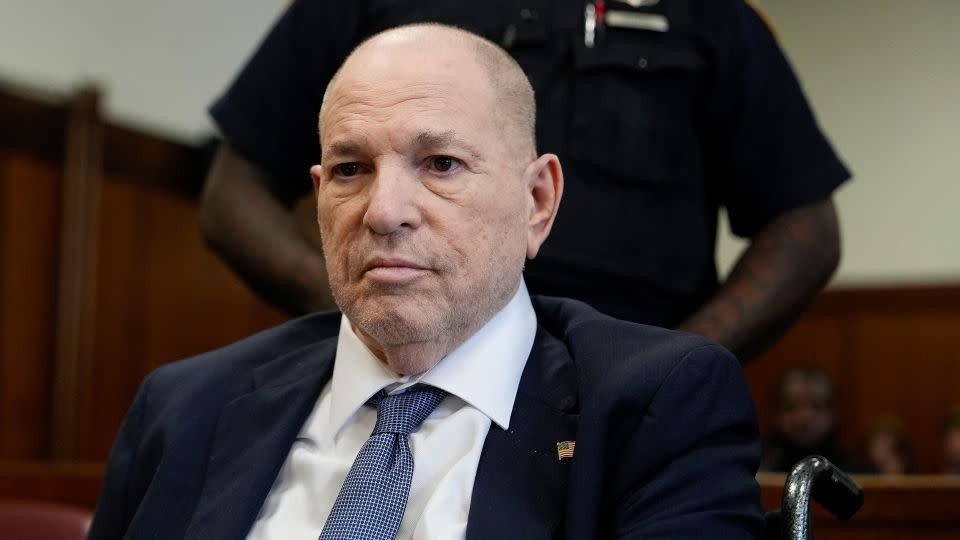New accusers against Harvey Weinstein have come forward ahead of retrial, prosecutor says

A Manhattan prosecutor said Wednesday a new indictment against Harvey Weinstein is possible as additional accusers have come forward with claims against the powerful Hollywood producer whose downfall became a symbol of the #MeToo movement.
Assistant District Attorney Nicole Blumberg told Manhattan Supreme Court Justice Curtis Farber that prosecutors are “actively investigating” the claims by the new accusers and that “not all are ready to speak out.”
When the judge asked if there was a possibility of a new indictment against Weinstein, Blumberg said, “Yes, your honor.”
Prosecutors are assessing which claims fall under the statute of limitations, Blumberg said.
“We need the survivors’ identities protected,” Blumberg told the court. “The survivors must feel comfortable.”
Wednesday’s hearing ahead of Weinstein’s retrial comes just over a month after the New York Court of Appeals – by a 4-3 vote – ruled the testimony of “prior bad acts” witnesses should not have been allowed because it “was unnecessary to establish defendant’s intent and served only to establish defendant’s propensity to commit the crimes charged.”
Weinstein, 72, was convicted in 2020 of first-degree criminal sexual act and third-degree rape, and he was sentenced to 23 years in prison. He has maintained his innocence and denied any nonconsensual sexual activity.
On Wednesday, prosecutors again asked the court to remind Weinstein’s lawyers not to make public statements disparaging potential witnesses “that could materially prejudice the case.”
Defense attorney Arthur Aidala, speaking outside court earlier this month, accused witness Miriam “Mimi” Haley of lying to jurors about her “financial interest” in coming forward with the allegations. He said Haley will be cross-examined on the issue “if she dares to come and show her face here.”
Aidala told the court Wednesday, “In 32 years no one has had to remind me of my ethical obligations.”
Aidala said his statements about Haley were “accurate” and that he was not trying to intimidate the witness.
The next hearing was set for July 8 and Farber requested that prosecutors alert the defense if they pursue a new grand jury.
The defense told CNN Weinstein may testify before the grand jury if that happens.
Weinstein has remained behind bars because he was sentenced last year in Los Angeles to 16 years in prison on charges of rape and sexual assault. That trial similarly used “prior bad acts” witnesses and has also been appealed.
He was one of the most powerful men in Hollywood and helped produce movies such as “Pulp Fiction,” “Clerks” and “Shakespeare in Love” until a wave of women spoke publicly about the pervasiveness of sexual abuse and harassment in what became known as the #MeToo movement.
The ruling overturning Weinstein’s New York conviction led to a range of reactions, with his attorneys saying it confirmed their claim of an unjust trial and his accusers and their advocates calling the decision a step back in holding perpetrators of sexual violence accountable for their crimes.
The New York charges were directly based on the testimony of Haley and Jessica Mann. Haley testified that Weinstein forcibly performed oral sex on her in 2006 at his Manhattan apartment, and Mann testified that he raped her in 2013 during what she described as an abusive relationship.
In addition, three other women testified at trial as “prior bad acts” witnesses. Prosecutors sought to establish a pattern of abuse. The three women – Dawn Dunning, Tarale Wulff and Lauren Young – each said Weinstein used his influence to take advantage of them when they were young and hoping to break into the film industry.
After Weinstein was convicted in New York, his attorneys appealed the verdict. They argued the “prior bad acts” witnesses should not have been allowed to testify and the court should not have given prosecutors the ability to question Weinstein about instances of verbal abuse and bullying on cross-examination. Weinstein ultimately did not testify.
The Court of Appeals agreed with the defense, ruling the trial court erred in admitting “the testimony of uncharged, alleged prior sexual acts against persons other than the complainants of the underlying crimes because that testimony served no material non-propensity purpose.”
The use of “prior bad acts” witnesses has increased in recent years with the rise of the #MeToo movement. In sexual assault cases, their testimony can turn a difficult “he said, she said” case into a more convincing “he said, they said” case.
In general, evidence that the defendant has poor character or has done bad things in the past is not allowed at trial amid concerns the jury will be overly influenced by these prior incidents and may ignore actual evidence of the alleged crime.
CNN’s Ray Sanchez contributed to this report.
For more CNN news and newsletters create an account at CNN.com


